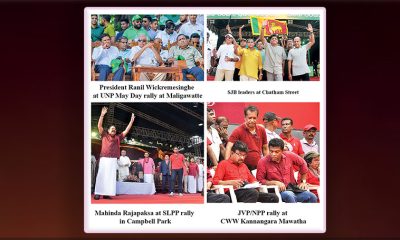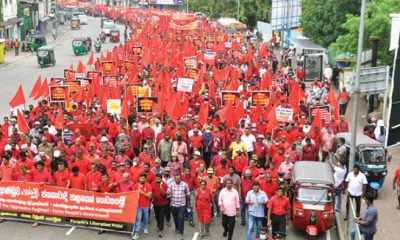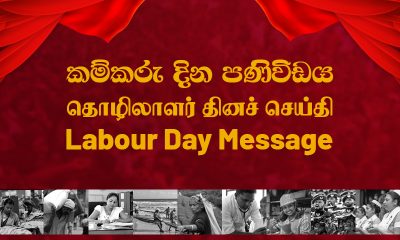News
Prez asks Opp. to cooperate
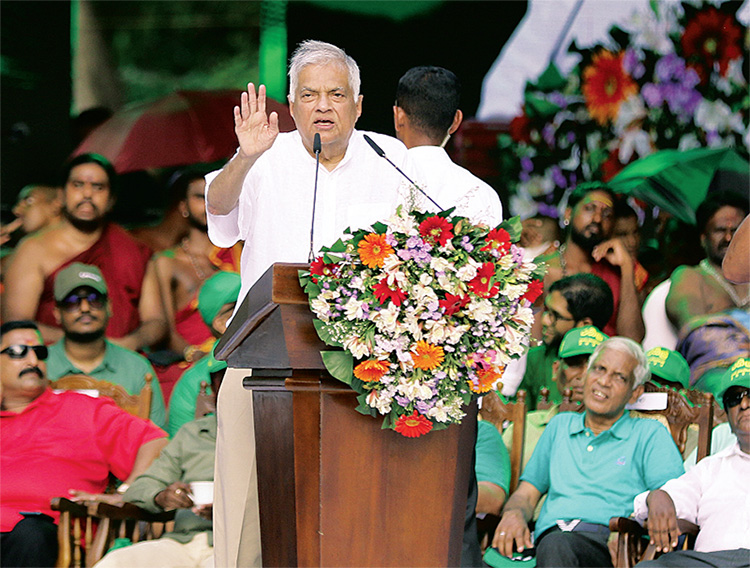
By Chaminda Silva
President Ranil Wickremesinghe yesterday (May Day) urged the JVP-led NPP, the SJB and other political parties not to undermine ongoing economic recovery efforts.
UNP leader Wickremesinghe said they were duty-bound to ensure the continuation of the measures taken since July 2022 to restore normalcy in the country.
Addressing the UNP May Day rally at Maligawatte, Colombo, Wickremesinghe warned them of dire consequences unless they supported his efforts.
The President disclosed that he would introduce a law inclusive of the agreements that the government had reached with the IMF. The President asked the Opposition to help him pass the law to continue to safeguard the current stable situation that the country has acquired.
President Wickremesinghe said: “We should modernise the economy of the villages to eliminate poverty. We have already commenced that programme. I will create a strong export-oriented economy and bring forward a proper method of creating a better future for the youth of this country.”
“So I request the SJB and the JVP not to remain in the traditional politics but to join hands to safeguard the economy and to create a better future for the youth of this country”, he added.
“Some people say that I am a dictator,” the President said.
“Today, different parties hold rallies and processions around Colombo city. SLPP is in the Campbell Park, SJB is holding a rally at Chatham Street, [Palani] Digambaram is in Thalawakele, the CWC [Ceylon Workers’ Congress] is holding their rally at Kotagala, JVP is in Jaffna…”
“This is democracy. Everyone can hold rallies, and they can even criticise me. This situation was not prevalent in the country two years ago”, the President said.
“At one point the Opposition Leader was attacked on the Galle Face Green and chased away. Today, we have given him the space at Chatham Street. Isn’t this democracy?” he asked
“I express my gratitude to each and every party that supported me in building up the country to this state again. Members from the SLPP, a group from the SLFP, Douglas Devananda, the CWC and several others joined hands with me”, the President said.
“I invite the other parties, the SJB, the JVP should not oppose this, to reach an agreement with the government to safeguard this situation for the people.”
President Wickremesinghe also recalled the circumstances under which he accepted the challenge after the SJB declined to accept the premiership and the events leading to the Army thwarting a bid to seize control of Parliament.
Latest News
Advisory for Heavy Rain issued for the Central, Uva and Sabaragamuwa provinces and in the Ampara, Batticaloa and Polonnaruwa districts

Advisory for Heavy Rain Issued by the Natural Hazards Early Warning Centre at 12.00 noon on 21 February 2026 valid for the period until 08.30 a.m. 22 February 2026
Due to the low level atmospheric disturbance in the vicinity of Sri Lanka, Heavy showers above 100 mm are likely at some places in the Central, Uva and Sabaragamuwa provinces and in the Ampara, Batticaloa and Polonnaruwa districts and fairly heavy showers above 75 mm are likely at some places elsewhere.
Therefore, the general public is advised to take adequate precautions to minimize damages caused by heavy rain, strong winds and lightning during thundershowers.
News
Ravi demands full disclosure on Lanka’s usable reserves, flags forex leakages
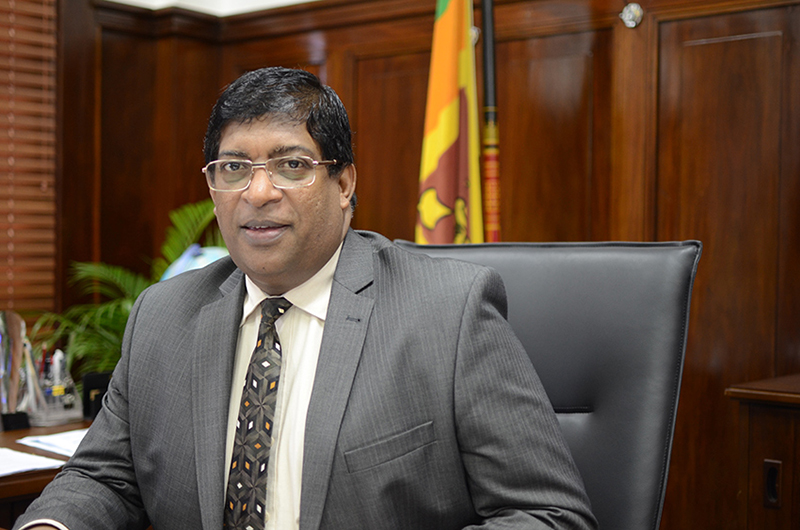
Opposition MP Ravi Karunanayake on Wednesday called for an urgent government statement to Parliament on the integrity and usability of Sri Lanka’s Gross Official Reserves (GOR), raising concerns over foreign exchange leakages and regulatory consistency under the Foreign Exchange Act No. 12 of 2017.
Raising the issue under Standing Order 27 (i), Karunanayake urged the Government to provide a comprehensive disclosure on the composition, encumbrances and deployability of the country’s reserves, as well as on the Central Bank’s oversight of foreign currency transactions.
“Reserve credibility depends not merely on headline numbers, but on transparency, enforceability and consistency in regulation,” the MP told the House.
He sought clarification on the latest reported GOR figure and the net usable reserves after excluding encumbered assets, swaps and pledged balances. He also requested details of annual revenue earned on reserves from 2023 to 2025.
Following are the questions raised by MP Karunanayake:
1. What is the latest reported GOR figure, and what is the net usable reserve after excluding encumbered assets, swaps, and pledged balances? What is the revenue earned on are GOR 23-25 per year?
2. Provide a separate and detailed breakdown of GOR, including: (a) Monetary gold (quantity and valuation basis) is it real gold or gold paper? (b) Foreign currency assets by major currency and instrument; (c) SDR holdings; (d) IMF reserve position; (e) Foreign currency swaps, specifying counterparty type, principal amount, tenure, maturity profile, and all-in cost; (f) Domestic swaps, specifying amount, tenure, rollover terms, collateralisation, and effective cost.
3. Of the total reserves reported, how much is encumbered, swap-backed, or otherwise not immediately deployable for debt servicing or currency stabilisation?
4. What SLR spread, fee, or margin does the Central bank apply when buying or selling USD to the Government for reserve accumulation and external debt servicing and what total profit or gain has the C.bank realised from such transactions during the past three financial years? Advice per year.
5. Is the Central Bank subject to continuous and statutory audit by the Auditor General? If so, will the Government table the most recent audit report, specifying audit scope, sample size, reserve confirmations, swap verification and gold custody validation?
6. What triggered the recent circular warning domestic institutions on foreign currency transactions?
7. Has the C.bank quantified foreign exchange and tax revenue losses resulting from Sri Lanka-based businesses routing credit card and commercial payments through overseas payment gateways?
8. If domestic entities are regulated strictly, why has a binding circular not been issued against noncompliant business entities using foreign payment gateway arrangements that divert foreign exchange outside Sri Lanka’s regulated banking system?
The government asked for two weeks’ time to respond to the queries.
by Saman Indrajith
News
Sajith exposes highly questionable coal imports from South Africa in 25 vessels; calls for independent probe
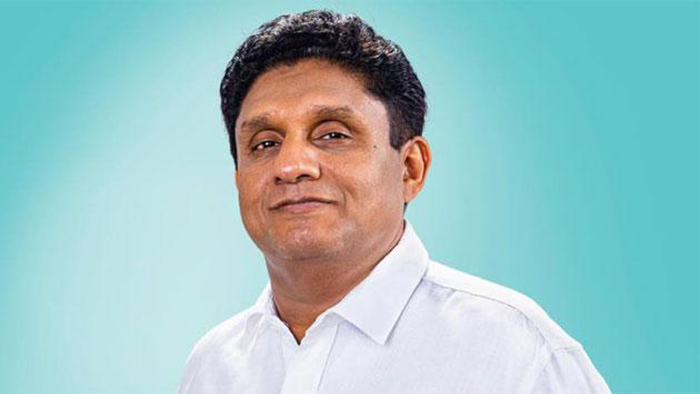
Opposition Leader Sajith Premadasa yesterday alleged in Parliament that eight recently imported coal shipments were substandard and called for an independent probe into the matter.Speaking in the House, Premadasa said Sri Lanka typically requires 36–38 coal shipments annually. While 11 Russian shipments received so far had raised no concerns, he claimed that 25 vessels ordered from South Africa under a new tender were facing quality issues.
He cited combustion reports from the Norochcholai Coal Power Plant showing that the eight shipments already received under the new tender failed to generate the expected 300 megawatts per unit. According to the MP, the outputs were: 285 MW, 290 MW, 260 MW, 295 MW, 285 MW, 270 MW, 275 MW, and 255 MW.
“These are scientific data generated automatically through boiler combustion reports that cannot be altered,” Premadasa said, asserting that the figures indicate the coal supplied was below required standards.
He warned that low-quality coal could increase fuel consumption, raise operational costs, and damage equipment. Any shortfall in power generation, he said, would necessitate additional coal imports or greater reliance on diesel power, ultimately driving up electricity tariffs for consumers.
“The loss will have to be borne by the electricity consumer,” Premadasa said, urging the government to clarify whether the shipments met required specifications.
He also criticized delays and changes in tender requirements, alleging that supplier eligibility criteria had been relaxed to allow non-standard providers.
by Saman Indrajith
-

 Life style7 days ago
Life style7 days agoMarriot new GM Suranga
-

 Business6 days ago
Business6 days agoMinistry of Brands to launch Sri Lanka’s first off-price retail destination
-

 Features7 days ago
Features7 days agoMonks’ march, in America and Sri Lanka
-

 Features7 days ago
Features7 days agoThe Rise of Takaichi
-

 Features7 days ago
Features7 days agoWetlands of Sri Lanka:
-

 News7 days ago
News7 days agoThailand to recruit 10,000 Lankans under new labour pact
-

 News7 days ago
News7 days agoMassive Sangha confab to address alleged injustices against monks
-

 Sports2 days ago
Sports2 days agoOld and new at the SSC, just like Pakistan




